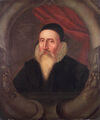Template:Selected anniversaries/July 13: Difference between revisions
No edit summary |
No edit summary |
||
| Line 9: | Line 9: | ||
||1793 – Jean-Paul Marat, French physician and theorist (b. 1743) | ||1793 – Jean-Paul Marat, French physician and theorist (b. 1743) | ||
||Johann III Bernoulli (d. 13 July 1807, Berlin), grandson of Johann Bernoulli, and son of Johann II Bernoulli. He was known around the world as a child prodigy. Pic. | |||
||1831 – Arthur Böttcher, German pathologist and anatomist (d. 1889) | ||1831 – Arthur Böttcher, German pathologist and anatomist (d. 1889) | ||
||Karl Wilhelm Gottlob Kastner (d. 13 July 1857) was a German chemist, natural scientist | ||Karl Wilhelm Gottlob Kastner (d. 13 July 1857) was a German chemist, natural scientist and a professor of physics and chemistry. | ||
||1863 – New York City draft riots: In New York City, opponents of conscription begin three days of rioting which will be later regarded as the worst in United States history. | ||1863 – New York City draft riots: In New York City, opponents of conscription begin three days of rioting which will be later regarded as the worst in United States history. | ||
Revision as of 17:43, 12 April 2018
100 BC: Roman general and statesman Julius Caesar born. He will play a critical role in the events that led to the demise of the Roman Republic and the rise of the Roman Empire.
1527: Mathematician, astronomer, and astrologer John Dee born. He will achieve high status as a scholar and play a role in Elizabethan politics.
1956 – John McCarthy (Dartmouth College), Marvin Minsky (MIT), Claude Shannon (Bell Labs), and Nathaniel Rochester (IBM) assemble the first coordinated research meeting on the topic of "Artificial intelligence" at Dartmouth College in Hanover, NH. USA.
1972: Signed first edition of Skip Digits, Conductor sells for one million dollars; House Democrats say money trail leads to Richard Nixon.
1973: Watergate scandal (nonfiction): Alexander Butterfield reveals the existence of the "Nixon tapes" to the special Senate committee investigating the Watergate break-in.
1974: Mathematician and crime-fighter Hilary Putnam publishes his landmark paper arguing that mathematics is not purely logical, but "quasi-empirical", and that we should beware the possibility of "quasi-empirical crimes".






